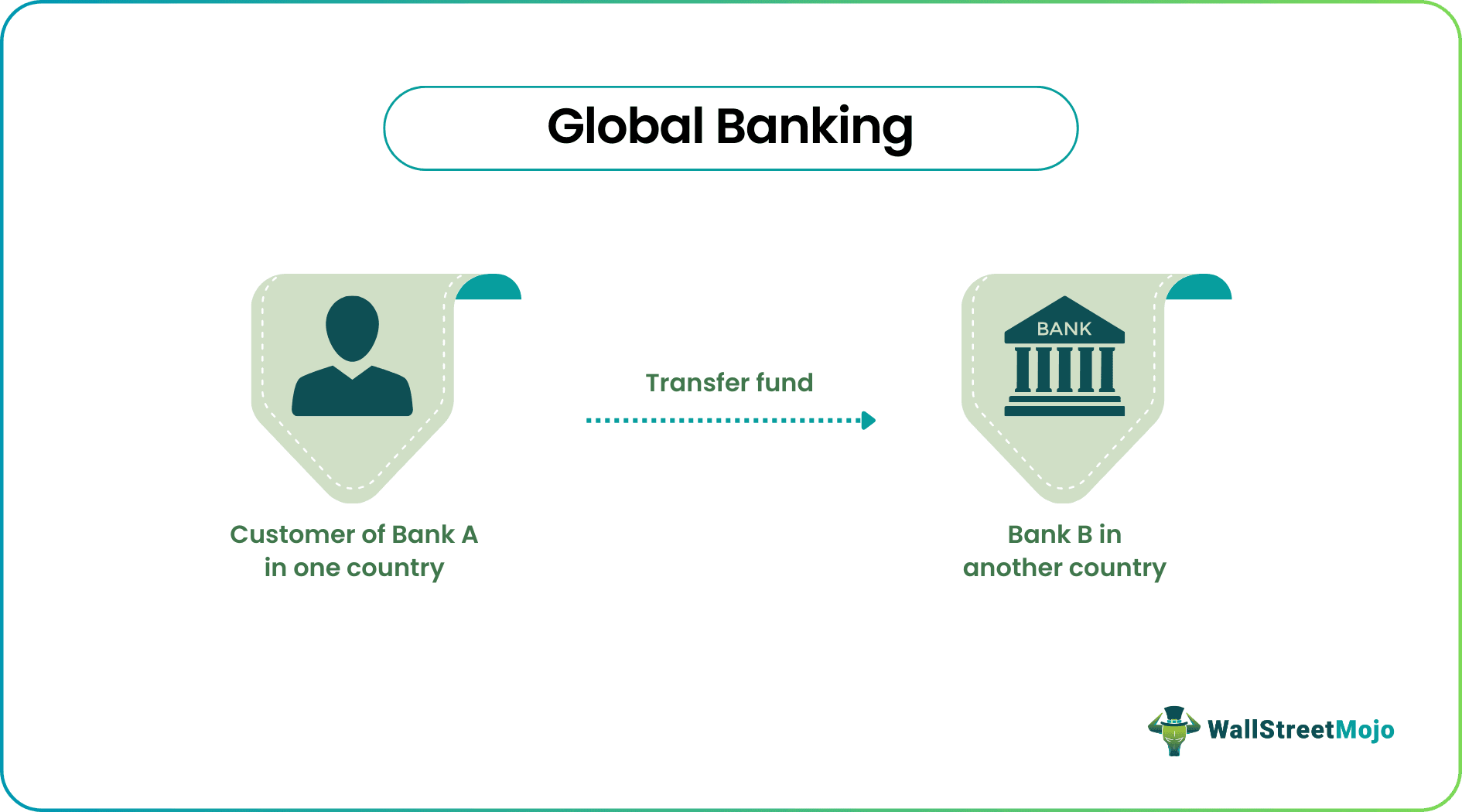Table Of Contents
What Is Global Banking?
Global Banking refers to the banking system that enables customers to make international fund transfers, especially cross-border payments. Although these financial institutions are located in one nation, they have a universal banking model to support global remittances, exchange, trade, and finance.

The commercial banking framework ensures the domestic mobility of funds and profit-making. Hence, they designed global banking institutions to foster international financial integration and cross-border financial stability. These financial institutions provide various banking solutions to their clients, which include cross-border commercial banking services, investment banking, raising capital, facilitating mergers and acquisitions, and providing custom-made international financial solutions.
Key Takeaways
- The global banking system refers to the financial arrangement that enables cross-border transfers of funds, payments, or any bespoke financial services on the international front.
- It facilitates international trade, commerce, remittances, finance, and any other financial interaction to ensure global financial stability and integration.
- Global banks or correspondent banks make use of a secured gateway, i.e., the Society for Worldwide Interbank Financial Telecommunication (SWIFT), to enable cross-border transactions conveniently, spontaneously, and in a cost-efficient manner.
- It differs from the global markets, which facilitate the international exchange of goods, commodities, services, financial securities, currencies, etc.
Investors seeking a comprehensive platform may consider Saxo Bank International for a variety of account types and investment options.
How Does Global Banking Work?
Global banking is an age-old concept developed in the 16th century to support international trade. However, as the banking systems evolved, these services were confined within national boundaries. But, with the emergence of globalization and international trade and commerce, cross-border banking became inevitable. Thus, global banking institutions operate worldwide through the Society for Worldwide Interbank Financial Telecommunication (SWIFT).
The Hargreaves Lansdown provides access to a range of investment products and services for UK investors.
SWIFT is a secure messaging network that connects over 11,000 correspondent banks globally and handles millions of transactions daily. Correspondent banks declined the SWIFT transactions numerous times due to their high fees or delayed payments. Hence, SWIFT introduced SWIFT GPI to ensure speedy payments at lower charges and a more efficient tracking and confirmation system.
Let us understand the process briefly. When someone in one country wants to make a payment to a party in another country, their local bank calculates the foreign exchange rate, withdraws the amount, and transfers it to a correspondent account with the respective foreign bank (in the receiver's nation).
The correspondent bank then pays that receiver in their currency (i.e., the foreign currency). However, such international payments are comparatively more expensive and take more time than local transactions. Moreover, their routing and instructions are commanded by special codes like the Business Identifier Code (BIC) or International Bank Account Number (IBAN). Also, the correspondent banks enable such cross-border transfers through the Nostro account and Vostro account.
For efficient cross-border payments, many individuals and businesses use the Wise Money Transfer UK or Wise Money Transfer US services for transparent and low-cost transfers.
Examples
Now let us consider some examples that explain the significance of global banking in the current scenario of international trade and commerce:
Example #1
Suppose Charles is a resident of Brazil, but a company located in New York employs him as a software engineer. He sends $7000 every month to his family in Brazil. For this purpose, he leverages the global banking services offered by ABC Bank, New York. Now, ABC Bank draws the money from Charles' respective account (maintained at ABC Bank) every month and credits this sum to their correspondent account maintained at LMN Bank in Brazil, which is a foreign bank. Now, the LMN Bank converts the USD into Brazilian Real and deposits it in the account holder's father's account.
Example #2
UBS is a leading global bank on the list of the top 30 global banks. This Swiss bank has recently acquired its competitor, Credit Suisse, for $3.2 billion with the aim of strengthening its global position. Over half of UBS's clientele is based in the U.S., benefiting from the vigilance provided by Swiss law. Despite this, the U.S. authorities have forced both UBS and Credit Suisse to cease their alleged business practices.
Moreover, global concerns about the vulnerability of banks like UBS being too big to fail flared during the rapid takeover of Credit Suisse, prompting the Swiss National Bank to pledge over $100 billion in support. While the deal faces challenges from certain bondholders, UBS anticipates enhanced global competitiveness following the acquisition.
2023 Global Banking Crisis
The 2023 global banking crisis witnessed the downfall of some prominent global banks like Signature Bank, Silicon Valley Bank (SVB), and First Republic Bank. The investors and customers were concerned about the global banking failure. However, the government implemented various measures to stabilize the financial sector, and the struggle is still ongoing. Let us now understand the whole scenario:
1. Causes:
The various instances that led to the banking crisis in 2023 were:
1. The global banks heavily invested in Treasury securities during the COVID-19 recession, hindering profits when interest rates went up.
2. The economic indicators, including an inverted yield curve, signaled the onset of a recession.
3. Pandemic-induced remote work kept decreasing real estate values, resulting in the vacancy of many commercial buildings.
2. Major Bank Failures:
The above pressures failed the following banks:
1. First Republic Bank: This banking institution faced a liquidity crisis resulting in the seizure of its operations by the Federal Deposit Insurance Corporation (FDIC) on April 28, 2023. It was then ultimately sold to JPMorgan Chase.
2. Silicon Valley Bank (SVB): This financial institution declared insolvency on March 10, 2023, facing a bank run. Ultimately, it was acquired by First Citizens Bank.
3. Signature Bank: It was investigated for its cryptocurrency activities and placed under FDIC receivership on March 12, 2023. Later, the bank was taken over by the New York Community Bancorp.
3. Government Measures:
The Federal government and the Federal Reserve enacted various programs, reforms, and measures to handle this crisis, as discussed below:
1. The Federal Reserve issued emergency credit on liberal terms. Also, the Fed and Treasury officials declared all the depositors as a whole.
2. The Fed Vice Chair for Supervision recognized the lack of supervision and action to avoid such a crisis, while the enforcement of the Dodd-Frank Act and the small and mid-sized banks not stress-tested contributed to the condition.
3. Moreover, the Fed funds rate was leveled up by 25 basis points on July 26, 2023, to align the interest rates with inflation.
4. The Fed Chair, Jerome Powell, simultaneously made potential policy adjustments based on labor markets, prices, and financial developments.
5. Indeed, the Bank Term Funding Program's interest rates were set at 5.44% as of August 7, 2023.
All these efforts signify that federal officials aim to foster positive investor sentiment, boost the confidence of the citizens, and assure them that their funds are in safe hands.
Importance
Global banking is a reflection of the modern financial system, thus fostering global cooperation and economic integration. Some of its foremost significances are discussed below:
- Supports International Trade and Remittances: Global banking has opened ways for securely transferring funds from one nation to another, whether to make a payment on international purchases or send money across the seas to family members.
- Global Economic Interaction: As the world economies foster a culture of global exchange and interconnection, this banking system supports financial interaction and transactions beyond national boundaries.
- International Fund Transfers: Global banking and markets have integrated systems with advanced technology and secure gateways like SWIFT to build a robust and innovative financial infrastructure worldwide. Modern financial institutions rely on specialized IT services for banks to maintain secure payment systems and meet evolving regulatory requirements.
- Global Economic Stability: With such banking facilities, developing nations get an equal opportunity for growth. Thus, it promotes economic stability and development on the global front.
- Cross-Border Banking Solutions: This facility helps people of different nations quickly, conveniently, and affordably transfer or receive money internationally.
Global Banking vs Global Markets
Global banking and markets are the two different international arrangements that cater to the varied needs of customers in different nations. Let us discover these dissimilarities:
| Basis | Global Banking | Global Markets |
|---|---|---|
| Definition | Global banking is a financial arrangement that facilitates international payments and the transfer of funds to clients. | Global markets are the marketplace that enables the cross-border exchange of financial instruments, goods, services, commodities, and labor. |
| Scope | International financial transactions and the transfer of funds. | It helps in international trade, or the exchange of goods, services, commodities, financial instruments, currencies, and labor. |
| Services | It provides commercial banking services like savings account deposits, loans and advances, fund transfers, payments, capital raising, investment banking facilities, and other financial services. | It offers facilities like asset management, securities trading, exchange of commodities, underwriting, etc. |
| Customer Relationships | Offers tailored financial solutions catering to diverse customer needs. | Emphasizes the overall market dynamics, trading strategies, and risk management. |
| Tenure | It builds long-term relationships with clients. | The association between parties can be short-term or long-term. |
Want a smarter way to bank on the go? Revolut offers a user-friendly app with global access, crypto and stock trading, and innovative budgeting tools—all in one powerful platform.
Disclosure: This article contains affiliate links. If you sign up through these links, we may earn a small commission at no extra cost to you.
Frequently Asked Questions (FAQs)
Global banking is not just confined to investment banking; it has a broader perspective since it also involves leasing, transaction services, capital markets, corporate banking, and other financial services in the international market.
The first global banking crisis occurred between mid-2007 and early 2009 with the busting of the U.S. housing bubble. As the housing market collapsed across the nation, the value of housing started to fall. At the same time, a majority of mortgage borrowers couldn't pay their debts secured against their houses, which led to a significant financial crisis that soon affected the global markets and the global banking system.
The Committee on the Global Financial System (CGFS) monitors and ensures financial stability across the international financial system.

